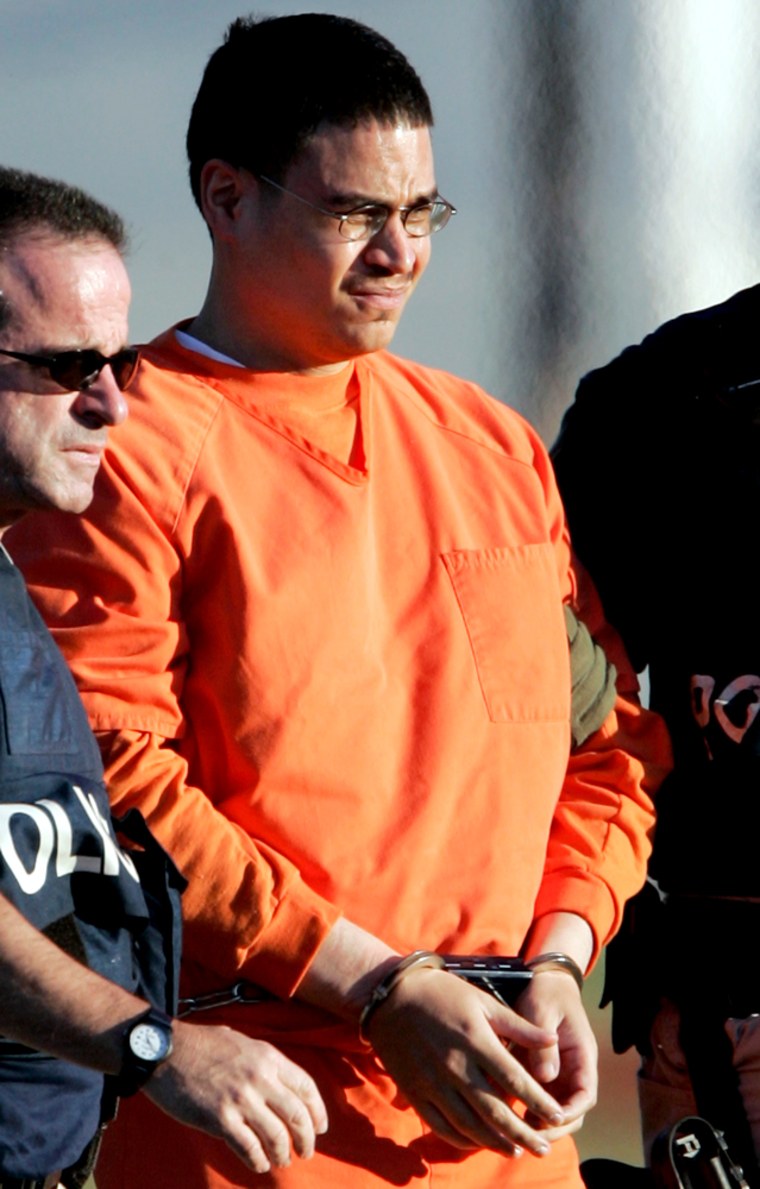To decide whether Jose Padilla and two other men are guilty of supporting terrorism, jurors are going to have to get inside their heads.
Was Padilla the “star recruit” of a terror support cell, or just a recent convert to Islam learning Arabic and the Quran? Did his co-defendants aim to support Islamic extremists in global conflict zones, or were they trying to help innocent Muslims suffering in those same areas?
The question of intent is critical for jurors who are expected to begin deliberating this week whether Padilla, Adham Amin Hassoun and Kifah Wael Jayyousi conspired to murder, maim and kidnap people overseas and provide material support to extremists in places like Afghanistan, Chechnya, Somalia, Bosnia and Lebanon.
“They decided that this end justified any means, including murder,” federal prosecutor Brian Frazier said in closing arguments Monday. “Jose Padilla was a mujahedeen recruit and an al-Qaida terrorist trainee.”
But Hassoun attorney Kenneth Swartz said in the first of three defense closing statements that “this case is all about speculation. It is not about proof of a crime. There is no intent to murder. The only intent is to provide relief.”
Deliberations start likely Wednesday
Attorneys for Padilla and Jayyousi were scheduled to give closing arguments Tuesday, followed by rebuttal from prosecutors. Jurors are likely to begin deliberations Wednesday.
Even if the assistance the defendants provided wound up in the hands of rebels or terrorists, U.S. District Judge Marcia Cooke instructed jurors that it is no crime if the trio intended that it be used for relief work such as helping refugees or buying medicine.
If convicted of the murder conspiracy charge, Padilla — who was once accused by the Bush administration of planning to detonate a radioactive bomb in the U.S. — and his co-defendants could be sentenced to life in prison. The two material support counts carry potential sentences of up to 15 years.
Padilla, a U.S. citizen, was held for 3½ years as an enemy combatant after his 2002 arrest in a purported al-Qaida “dirty bomb” plot, but his trial does not include those allegations.
Padilla is the centerpiece of the case, largely because prosecutors say he links the other two to al-Qaida and Osama bin Laden.
“Padilla was the star recruit of a terrorist support cell,” Frazier said.
Prosecutors want jurors to convict Padilla largely on the basis of a five-page “mujahedeen data form” he supposedly filled out in 2000 to attend an al-Qaida terrorist training camp in Afghanistan.
The CIA found that form in Afghanistan in late 2001. It contains seven of Padilla’s fingerprints, one of his alleged Muslim aliases, his birthday, notes the applicant’s ability to speak English, Spanish and Arabic and has other identifying details.
Padilla’s attorneys say he traveled overseas to study Arabic and go on a hajj, the annual pilgrimage to Mecca, not to train to be a terrorist. They called no witnesses on his behalf and introduced no evidence, adopting the risky strategy of suggesting to the jurors that prosecutors failed to prove their case.
The data form was not analyzed for fingerprints until last year, and the defense has theorized that Padilla handled it while he was held as an enemy combatant.
Little hard evidence?
There is little other hard evidence involving Padilla. Thousands of hours of FBI wiretap intercepts from 1993 to 2001 include numerous conversations of Hassoun and Jayyousi, but Padilla’s voice is heard on only seven.
There is also little direct evidence connecting Hassoun and Jayyousi, both 45, to any specific acts of violence or specific killings. The victims, according to prosecutors, would include the Russian army in Chechnya, Serbian forces in Kosovo and other military groups around the world.
Evidence does include numerous checks written by Hassoun and Jayyousi to various organizations that prosecutors say were involved in terrorism, such as the Global Relief Foundation and American Worldwide Relief.
Swartz said Hassoun gave thousands of dollars to relief organizations and staged fundraisers at South Florida mosques because of repeated atrocities directed against Muslims.
“Their passion was relief,” Swartz said of Hassoun and others. “There is no talk of terrorism or premeditated murder.”
